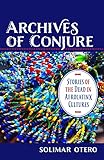Archives of Conjure : Stories of the Dead in Afrolatinx Cultures / Solimar Otero.
Material type: TextSeries: Gender, Theory, and ReligionPublisher: New York, NY : Columbia University Press, [2020]Copyright date: ©2019Description: 1 online resource : 20 b&w photographsContent type:
TextSeries: Gender, Theory, and ReligionPublisher: New York, NY : Columbia University Press, [2020]Copyright date: ©2019Description: 1 online resource : 20 b&w photographsContent type: - 9780231194327
- 9780231550765
- Afro-Caribbean cults
- Blacks -- Religious life -- Caribbean Area
- Blacks -- Caribbean Area -- Religious life
- Blacks -- Caribbean Area -- Rites and ceremonies
- Material culture -- Religious aspects
- Spirits
- Spiritualism -- Caribbean Area
- Water -- Religious aspects
- Women and spiritualism -- Caribbean Area
- RELIGION / Ethnic & Tribal
- 133.909729 23
- BF1242.C37
- online - DeGruyter
- Issued also in print.
| Item type | Current library | Call number | URL | Status | Notes | Barcode | |
|---|---|---|---|---|---|---|---|
 eBook
eBook
|
Biblioteca "Angelicum" Pont. Univ. S.Tommaso d'Aquino Nuvola online | online - DeGruyter (Browse shelf(Opens below)) | Online access | Not for loan (Accesso limitato) | Accesso per gli utenti autorizzati / Access for authorized users | (dgr)9780231550765 |
Browsing Biblioteca "Angelicum" Pont. Univ. S.Tommaso d'Aquino shelves, Shelving location: Nuvola online Close shelf browser (Hides shelf browser)

|

|

|

|

|

|

|
||
| online - DeGruyter Experiencing Design : The Innovator's Journey / | online - DeGruyter The Typographic Imagination : Reading and Writing in Japan’s Age of Modern Print Media / | online - DeGruyter The Huayan University Network : The Teaching and Practice of Avataṃsaka Buddhism in Twentieth-Century China / | online - DeGruyter Archives of Conjure : Stories of the Dead in Afrolatinx Cultures / | online - DeGruyter Arts of Address : Being Alive to Language and the World / | online - DeGruyter Scaling for Success : People Priorities for High-Growth Organizations / | online - DeGruyter Startup Myths and Models : What You Won't Learn in Business School / |
Frontmatter -- CONTENTS -- ACKNOWLEDGMENTS -- Introduction: Archives of Conjure -- 1. Residual Transcriptions -- 2. Crossings -- 3. Flows -- 4. Sirens -- Conclusion: Espuma del Mar, Sea- Foam -- Notes -- References -- Index
restricted access online access with authorization star
http://purl.org/coar/access_right/c_16ec
In Afrolatinx religious practices such as Cuban Espiritismo, Puerto Rican Santería, and Brazilian Candomblé, the dead tell stories. Communicating with and through mediums' bodies, they give advice, make requests, and propose future rituals, creating a living archive that is coproduced by the dead. In this book, Solimar Otero explores how Afrolatinx spirits guide collaborative spiritual-scholarly activist work through rituals and the creation of material culture. By examining spirit mediumship through a Caribbean cross-cultural poetics, she shows how divinities and ancestors serve as active agents in shaping the experiences of gender, sexuality, and race.Otero argues that what she calls archives of conjure are produced through residual transcriptions or reverberations of the stories of the dead whose archives are stitched, beaded, smoked, and washed into official and unofficial repositories. She investigates how sites like the ocean, rivers, and institutional archives create connected contexts for unlocking the spatial activation of residual transcriptions. Drawing on over ten years of archival research and fieldwork in Cuba, Otero centers the storytelling practices of Afrolatinx women and LGBTQ spiritual practitioners alongside Caribbean literature and performance. Archives of Conjure offers vital new perspectives on ephemerality, temporality, and material culture, unraveling undertheorized questions about how spirits shape communities of practice, ethnography, literature, and history and revealing the deeply connected nature of art, scholarship, and worship.
Issued also in print.
Mode of access: Internet via World Wide Web.
In English.
Description based on online resource; title from PDF title page (publisher's Web site, viewed 02. Mrz 2022)


